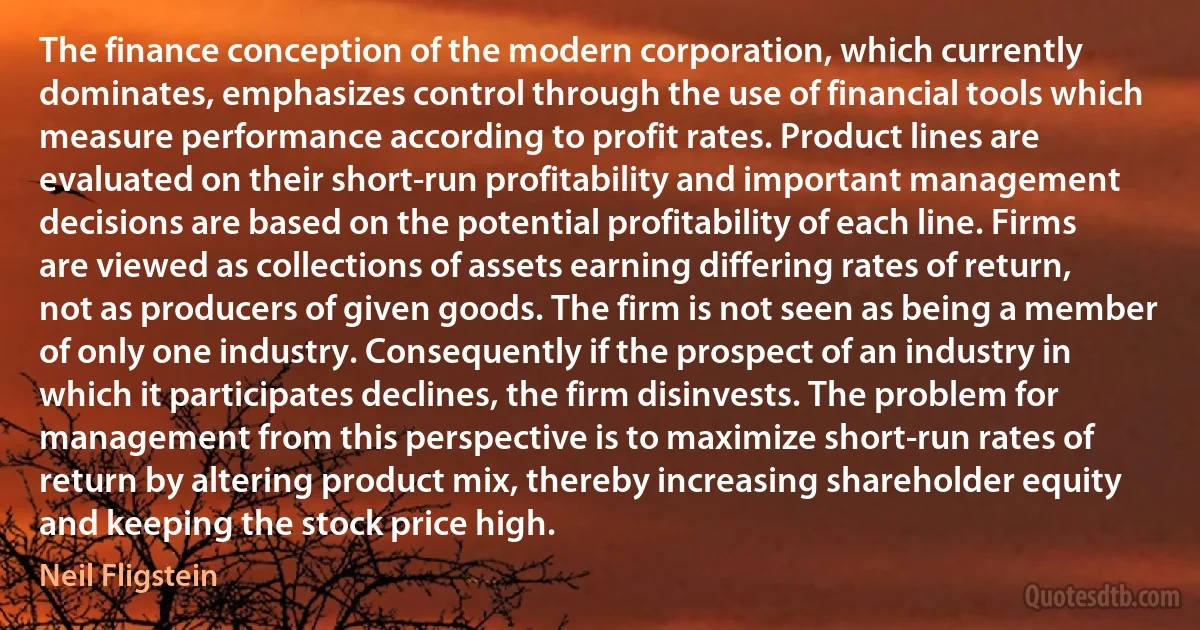
The finance conception of the modern corporation, which currently dominates, emphasizes control through the use of financial tools which measure performance according to profit rates. Product lines are evaluated on their short-run profitability and important management decisions are based on the potential profitability of each line. Firms are viewed as collections of assets earning differing rates of return, not as producers of given goods. The firm is not seen as being a member of only one industry. Consequently if the prospect of an industry in which it participates declines, the firm disinvests. The problem for management from this perspective is to maximize short-run rates of return by altering product mix, thereby increasing shareholder equity and keeping the stock price high.
Neil FligsteinRelated topics
altering assets conception control corporation equity given goods high increasing industry keeping line measure price problem profit return seen shareholder use profitabilityRelated quotes
I am confident that the enactment of the right bill next year will in due course increase our gross national product by several times the amount of taxes actually cut. Profit margins will be improved and both the incentive to invest and the supply of internal funds for investment will be increased. There will be new interest in taking risks, in increasing productivity, in creating new jobs and new products for long-term economic growth. Other national problems, moreover, will be aided by full employment. It will encourage the location of new plants in areas of labor surplus and provide new jobs for workers that we are retraining and facilitate the adjustment which will be necessary under our new trade expansion bill and reduce a number of government expenditures.

John F. Kennedy
It is a false doctrine that labor must assume all management. Those best suited for management must manage, whatever may lie their source. Every industry is searching eagerly for brains. My observation convinces me that most business firms pledged to welfare work are interested in their employed; they often remain open in order to protect those who serve them, even though it might be more profitable for them to close down. People need to stop to think, when the laborer clamors against the unorganized labor market, whether the menace is from the immigrant or from some other source. For no business enterprise wishes its help to leave that it may employ others; the turnover is one of the most expensive things industry has to face. The expense of breaking in new help is appalling.

Calvin Coolidge
I want to make sure you keep your eyes on the ball, that is, the two basic missions of a central bank. The first is maintaining macroeconomic stability: maintaining stable growth and keeping inflation low and stable. The principal policy tool for maintaining macroeconomic stability is monetary policy. In normal times, the Fed and other central banks use open market operations-purchases and sales of securities in markets-to move interest rates up or down, and in doing so try to create a more stable macroeconomic environment.
The second part of a central bank's mission is maintaining financial stability. Central banks are focused on trying to ensure that the financial system functions properly, and in particular, they want to prevent, if possible, and if not, to mitigate the effects of a financial crisis or a financial panic.

Ben Bernanke
There will be other crises in the national history which will make other demands for the fullest and most unselfish contribution to the national interest. No generation will be denied its opportunity, will be spared its duty, to put forth its best efforts. We devoutly hope that these contributions will not be demanded upon the field of battle. But they will be just as truly needed, just as urgently summoned, in the activities of peace, the efforts of industry, the performance of all the obligations of citizenship. We can not go out from this place and occasion without refreshment of faith and renewal of confidence that in every exigency our Negro fellow citizens will render the best and fullest measure of service whereof they are capable.

Calvin Coolidge
Every measurable thing except numbers is imagined in the manner of a continuous quantity. Therefore, for the mensuration of such a thing, it is necessary that points, lines, and surfaces, or their properties, be imagined. For in them... measure or ratio is initially found... Therefore, every intensity which can be acquired successively ought to be imagined by a straight line perpendicularly erected on some point of the space or subject of the intensible thing, e. g., a quality... And since the quantity or ratio of lines is better known and is more readily conceived by us-nay the line is in the first species of continua, therefore such intensity ought to be imagined by lines... Therefore, equal intensities are designated by equal lines, a double intensity by a double line, and always in the same way if one proceeds proportionally.

Nicole Oresme
